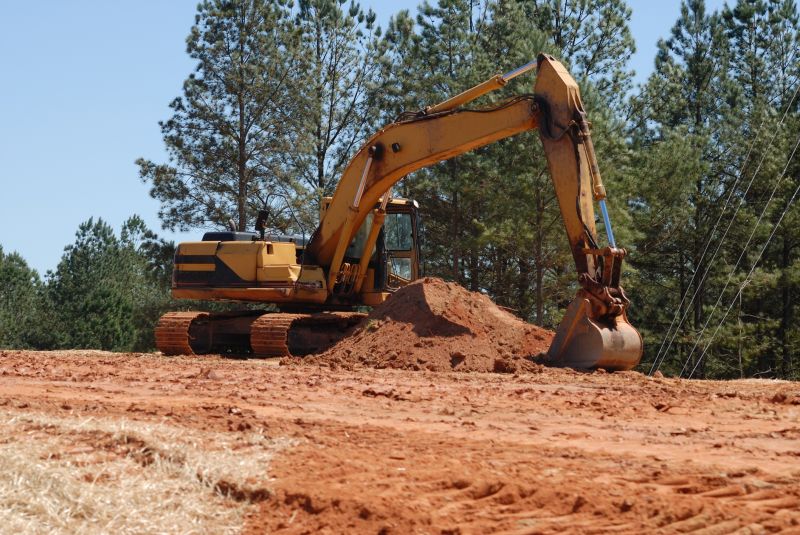Expert Picks for Outdoor Excavation Equipment You Can Trust
Get insights into high-performance tools and machinery favored by professionals for outdoor excavation work.
 Outdoor excavation projects often require a variety of specialized tools and equipment to ensure safety, efficiency, and effectiveness. Whether you're digging trenches for irrigation, installing fencing, planting trees, or performing minor landscaping tasks, having the right products can make a significant difference. These tools range from manual hand tools to powered machinery, each suited for different scales and types of excavation work. Selecting appropriate equipment involves understanding the scope of your project, the soil conditions, and your own physical capabilities.
Outdoor excavation projects often require a variety of specialized tools and equipment to ensure safety, efficiency, and effectiveness. Whether you're digging trenches for irrigation, installing fencing, planting trees, or performing minor landscaping tasks, having the right products can make a significant difference. These tools range from manual hand tools to powered machinery, each suited for different scales and types of excavation work. Selecting appropriate equipment involves understanding the scope of your project, the soil conditions, and your own physical capabilities.
Top Overall Option
Handheld Post Hole Digger
A manual handheld post hole digger offers versatility and control for small to medium excavation tasks such as installing fence posts, planting trees, or setting signs. Its lightweight design allows for precise digging in confined spaces, and it requires no power source, making it suitable for various outdoor environments. This tool is ideal for homeowners and DIY enthusiasts who prefer a straightforward approach to excavation projects.
Types of Products For Outdoor Excavations
Shovels and Spades
Fundamental manual tools for digging, moving soil, and shaping the landscape.
Pickaxes and Mattocks
Effective for breaking up hard soil, rocks, or compacted ground.
Post Hole Diggers
Specialized tools for creating deep, narrow holes for posts or poles.
Mini Excavators
Compact powered machinery suitable for larger excavation tasks with precision control.
Trenchers
Equipment designed to cut narrow trenches efficiently for utilities or drainage.
Augers
Power tools used to drill holes in the ground, often attached to drills or machines.
Wheelbarrows and Dump Carts
Tools for transporting excavated material across the site.
Safety Gear
Protective equipment including gloves, goggles, and boots for safe operation.
Extension Cords and Power Supplies
Essential accessories for powering electric excavation equipment.
Soil Compactors
Machines used to compress and stabilize soil after excavation.
Popular Choices
Versatile power tool for drilling holes in various soil types with minimal effort.
Robust manual tool suitable for digging, lifting, and moving soil or gravel.
Efficient equipment for creating trenches quickly over large areas.
Portable device for driving fence posts or stakes into the ground with ease.
Multi-purpose machinery capable of digging, lifting, and loading materials.
Ideal for breaking up soil before planting or small-scale excavation.
Powerful tool for drilling precise holes for planting or fencing.
Protect hands during manual excavation tasks.
Essential safety equipment for outdoor excavation projects.
Provides power for electric tools in remote outdoor locations.
Tool for loosening and breaking up compacted soil surfaces.
Convenient for transporting tools and materials across the site.
Useful for shaping pipes and conduits during excavation projects.
Sturdy for moving large quantities of soil or debris.
Helps manage water levels and remove excess water during excavation.
Used to compact soil or gravel after excavation for stability.
Increase reach for drilling in hard-to-access areas.
Manual tools such as shovels, spades, and pickaxes are versatile and essential for smaller tasks or areas where precision is necessary. For larger projects, powered equipment like mini excavators, trenchers, and augers can save time and reduce physical strain. Safety equipment including gloves, protective eyewear, and sturdy footwear should always accompany excavation activities to prevent injuries. Additionally, accessories like extension cords, replacement parts, and maintenance tools help ensure that powered equipment remains functional over time.
Proper planning and the right product selection can help mitigate common challenges such as soil compaction, underground obstructions, and uneven terrain. When choosing products, consider factors like weight, maneuverability, power source, and durability. Investing in quality tools and machinery can enhance productivity and safety, making outdoor excavation projects more manageable and enjoyable. Remember that thorough preparation and the right equipment are key to successful outdoor excavation endeavors.
Key Buying Considerations
- Project scope and size to determine the appropriate equipment scale.
- Soil type and condition, such as rocky, sandy, or clay soils.
- Power source preferences, including manual, electric, or gas-powered tools.
- Weight and maneuverability for ease of use and transportation.
- Durability and build quality to withstand outdoor conditions.
- Safety features and protective gear compatibility.
- Ease of maintenance and availability of replacement parts.
- Budget constraints and long-term value.
- Compatibility with existing tools or attachments.
- Storage space for equipment when not in use.
- Environmental conditions like moisture or extreme temperatures.
- User experience and comfort, especially for manual tools.
- Noise levels, especially for powered equipment in residential areas.
- Availability of warranties or customer support services.
- Regulations or permits required for certain machinery or projects.
This page contains affiliate links. We may earn a commission from qualifying purchases to support our content creation.
